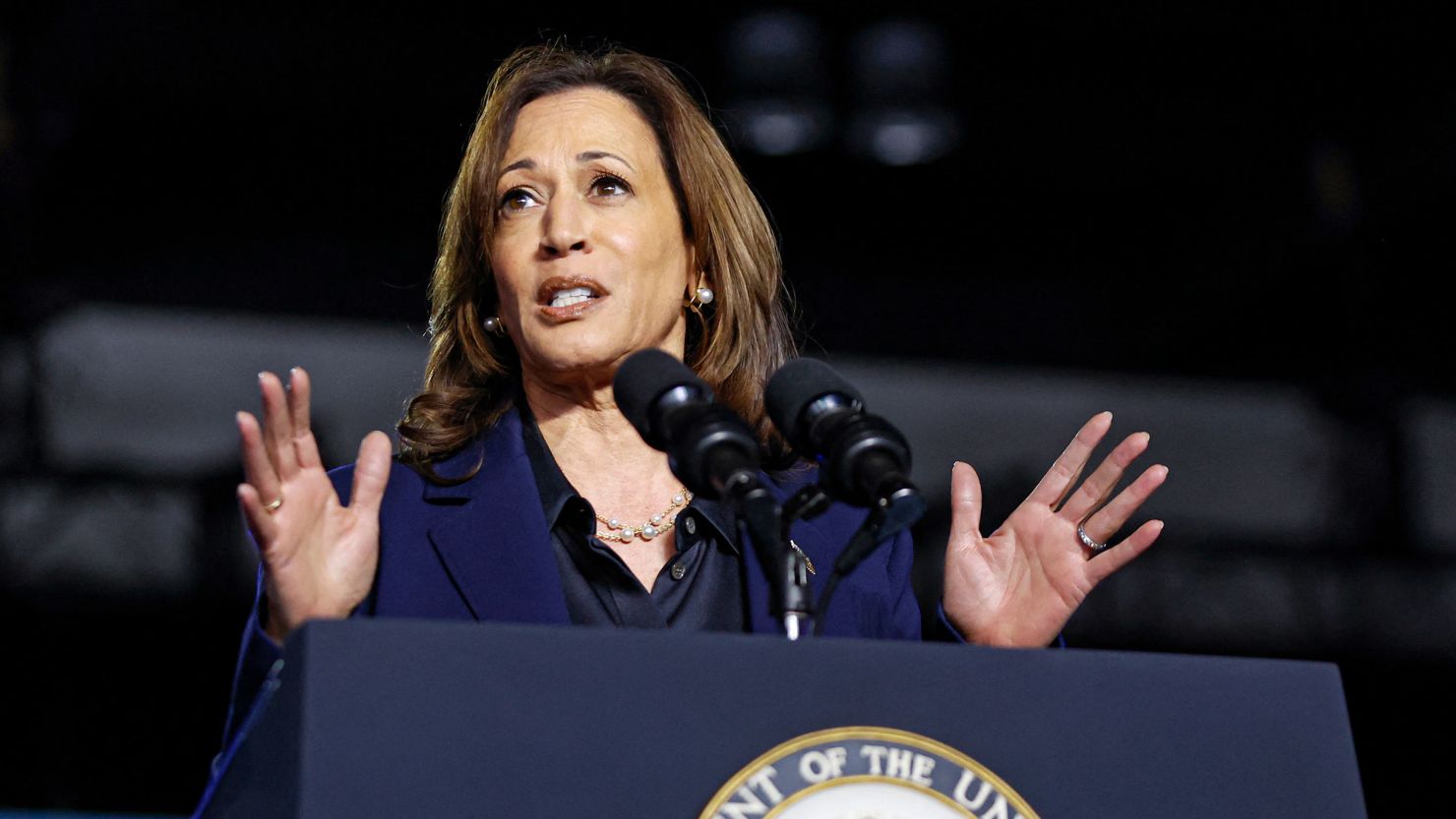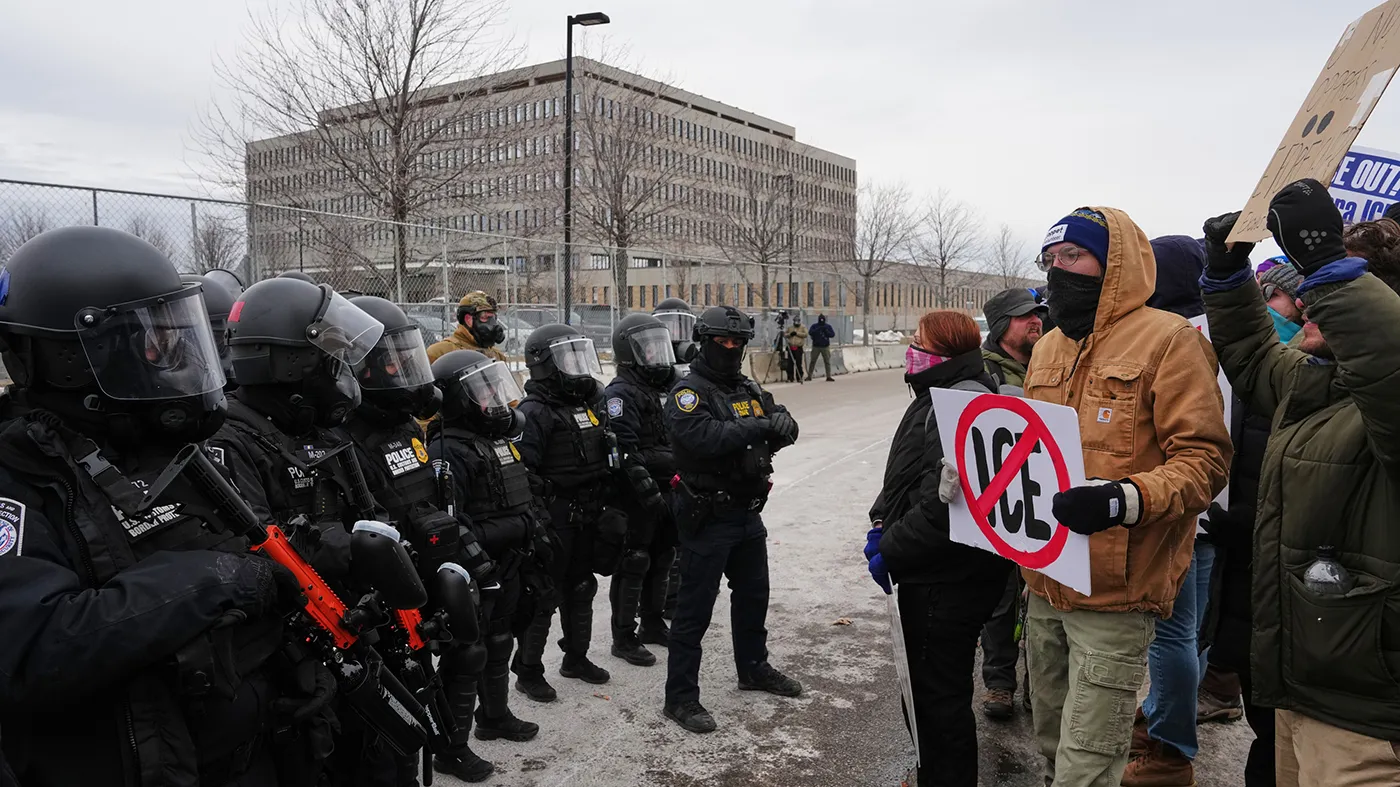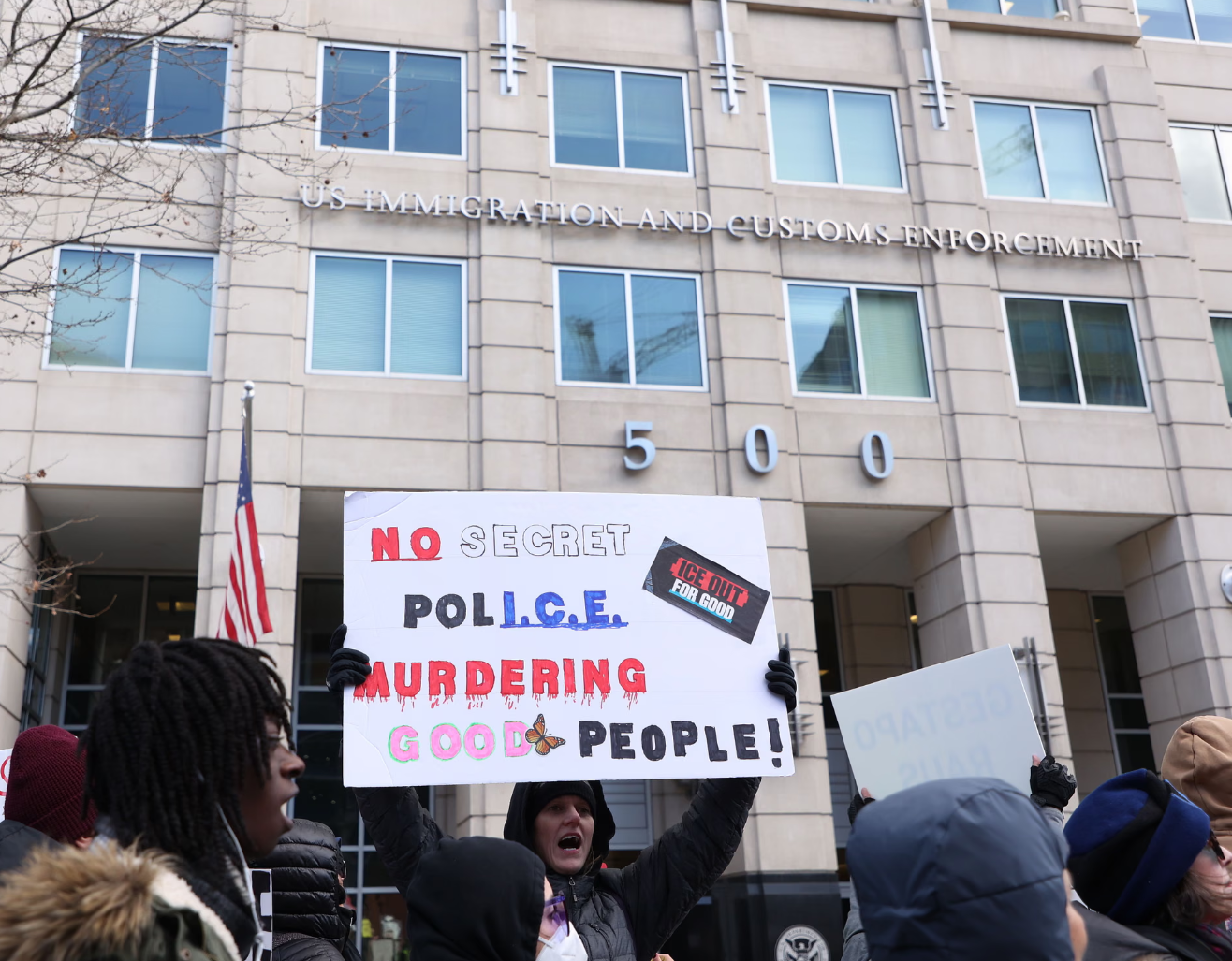Two Georgia megachurches hosted presidential candidates last week, highlighting the stark differences between how Kamala Harris and Donald Trump speak about faith and what Georgia’s Christian religious congregations expect of them.
Though Trump and Harris communicate differently to the public about their faith, religious leaders on the left and the right are casting this election in apocalyptic terms. And both candidates know religious voters will be essential to winning swing states like Georgia.
“It is so good to be here with everyone today and to worship with you,” Harris said from the pulpit to thousands gathered at New Birth Missionary Baptist church in south DeKalb county last Sunday. “On this day, then, I am reminded, with everything that we reflect on, on the parable from the Gospel of Luke.”
Four thousand people packed the pews of the predominantly-Black megachurch outside of Atlanta, one of the most prominent and powerful Black churches in America – a point of which pastor Jamal Bryant regularly reminds his congregation. New Birth owns more land than any Black church in America. It gave away $83m in college scholarships last year, he said.
It wields its political clout deftly. New Birth’s congregants include many of Atlanta’s most powerful political figures – mayors, sheriffs, members of Congress. Bryant said it has hosted appearances by five presidents.
But people who attend New Birth aren’t there for a stump speech. And Harris didn’t give one.
“You don’t want to give political speeches in a sanctuary, because you’re there to worship God,” said state senator Emanuel Jones, a DeKalb Democrat who attended church at New Birth last week. “To me, it is not a good use of a sanctuary to try and politicize – particularly on a Sunday, by the way – to try and mix politics with religion. I think she does a really good job of keeping them separate. She did that today, and we all should.”
Harris campaigned in Georgia with her pastor Rev Dr Amos Brown, pastor at Third Baptist Church of San Francisco and a contemporary of Martin Luther King Jr and other luminaries in Atlanta’s civil rights history. She told a CNN townhall a few days later that her first call after learning that Biden would be withdrawing was to Brown.
“I do pray every day,” she told Anderson Cooper. “Sometimes twice a day.”
Harris will discuss her faith when it comes up, but doesn’t go out of her way to portray her campaign as religiously motivated. Conversely, she never mentioned her campaign directly while speaking at New Birth. She shied away from the political themes common to her political rhetoric – abortion rights, the cost of living and the general unfitness of her opponent. She used the word “faith” 16 times in her 14-minute address.
“Faith is a verb,” she said. “We show it in action, in our deeds and in our service.”
Though she had not come to deliver a political speech, in a church with the flags of dozens of countries lining the balconies, the subtext was clear enough – a repudiation of conservative xenophobia about immigrants.
Elaine Montgomery heard it.
“Like she said, when you don’t help people like my neighbors and we all in this world,” Montgomery said. “Everything belongs to God.”
Montgomery, 69, from Stone Mountain, Georgia, was wearing a pink hat big enough to see from space that Sunday. She was on her way to vote. Her disdain for Trump’s expression of faith was plain.
“He’s a man speaking on a level that’s below God, I will say that,” Montgomery said. Her voice lowered. “I don’t really think Donald Trump had faith. I really don’t. I’m serious, you know, because if he had faith and he believed in Jesus Christ, he wouldn’t be doing the things he does.”
Faith matters in Georgia. White Christian evangelical beliefs correlate with the strongest support for Donald Trump, and about 38% of Georgians fall into that category, according to the Pew Research Center. Black voters in Georgia are also much more likely to be religious than the baseline, and Black voters represent about 30% of the electorate.
Georgia, in the heart of the Bible Belt, has one of the highest rates of regular church attendance in America at 42%.
Last Sunday, 42,694 voters cast a ballot in Georgia, many going in a “souls to the polls” push regularly organized by churches, particularly in metro Atlanta. In the flurry of conservative election legislation that followed the 2020 election in Georgia, a plan to eliminate Sunday early voting floated through the legislature. Outcry from pastors across the state ended that gambit. Mobilizing religiously-motivated voters is a necessary, if insufficient, requirement for any candidate to win a Georgia election.
Trump found himself in Zebulon, Georgia, last week, doing just that.
He was 45-minutes late to the faith townhall held at Christ Chapel church. Thousands of people packed its hall and sprawled into a parking lot ringed by semi-truck trailers with snipers on the roofs.
“You know, without religion, it’s like the – it’s like the glue that holds it all together. This would be a different country,” he said, noting a declining trend in religious participation, suggesting that “people started thinking a little bit differently and they got used to a different way of life” after the pandemic. He spoke about how Christians – particularly Catholics – faced unspecified “persecution” today in America.
But most of Trump’s comments at the “Believers and Ballots” townhall were campaign fodder about illegal immigration, how great his rallies have been and attacks on Harris and the Biden administration.
About 1,100 people live in Zebulon, about an hour-and-a-half south of Atlanta. Christ Chapel has about 1,600 members, with more at satellite campuses in middle Georgia.
Brian Hood, a congregant at Christ Chapel, said he expected Trump to speak about the border and inflation, but also freedom of religion.
“Donald J Trump professes to be a born-again Christian. Does that mean that he’s perfect? Of course not. None of us are. Anybody who says they are is a liar. He appeals to, not just Christians, but all the American people. He loves God and loves people, all walks of life.”
Georgia’s lieutenant governor, Burt Jones, a Republican and ally of the former president, asked Trump about coping with the assassination attempts and the pressure of the campaign. “How do you lean into your faith and your family to deal with this?”
“I say this. Faith – when you have faith, when you believe in God, it’s a big advantage over people that don’t have that. It’s a big advantage,” Trump replied.
It was the only substantial reference Trump made to his own faith in the abbreviated 40-minute forum for faith voters.
Ralph Reed, chairman of the Faith & Freedom Coalition and a longtime activist on the Christian right, succinctly laid out the stakes for antiabortion conservatives as he warmed up the crowd before Trump’s arrival.
Harris is “going to pass a federal law to impose abortion on demand on all 50 states,” Reed said. “And when she’s done doing that, she’s going to repeal the filibuster and then she’s going to pass a federal law imposing term limits on the supreme court which will instantly remove justices Clarence Thomas, Samuel Alito and John Roberts from the court and she’s going to replace them with the most leftwing radical extremist justices ever nominated. That’s her agenda.”
The first accomplishment listed on the campaign’s “Believers for Trump” website is how Trump appointed three supreme court justices, “which led to the end of Roe v Wade and broader protections for religious liberties.” Ending legal abortion is central to the religious conservatism of many of his supporters.
“I believe that life begins in conception. I cannot follow the dictates of being able to abort at any time,” said Carol Whitcomb of Stockbridge, a conservative who attended the Trump forum.
But it also may be a losing political position, even in Georgia. In every state where abortion rights have been a ballot referendum since the end of federal protections, voters have taken the more pro-choice position. Trump has generally avoided talking about abortion on the campaign trail, with no mention of it at all in a later appearance in Georgia last week.
Sandra Stargel of McDonough, Georgia, who attended the forum, has registered a change in Trump’s posture toward abortion, she said. “But, you know, I believe God has been talking to him, too. God has him here for a reason. I understand that women want to be in charge of their bodies. I get that. But in that case, they make birth control. Use it. Don’t just keep killing babies.”
Reed highlighted the stakes of the election: “We gather in this sanctuary 13 days before not only the most important election of our lifetimes but one of the most important elections in American history,” he said.
While Harris was at New Birth a few days earlier, the church’s pastor Bryant used similar rhetoric, likening this political moment to the biblical story of Esther and her obligation to save Jews from death. “If you are silent in this moment, your family will not survive,” Bryant said. “This is not the time for y’all to be bougie and stuck up. Generations of your unborn family are waiting to see what you do next.”




